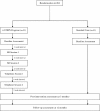Protocol for the "four steps to control your fatigue (4-STEPS)" randomised controlled trial: a self-regulation based physical activity intervention for patients with unexplained chronic fatigue
- PMID: 22429404
- PMCID: PMC3359226
- DOI: 10.1186/1471-2458-12-202
Protocol for the "four steps to control your fatigue (4-STEPS)" randomised controlled trial: a self-regulation based physical activity intervention for patients with unexplained chronic fatigue
Abstract
Background: Unexplained Chronic Fatigue is a medical condition characterized by the presence of persistent, severe and debilitating medically unexplained fatigue, leading to impaired functioning and lower quality of life. Research suggests that physical activity can contribute to the reduction of fatigue and other somatic symptoms and can thus significantly improve physical functioning and quality of life in these patients. Based on the self-regulation (SR) theory of behaviour change, we developed a brief physical activity program for patients suffering from unexplained chronic fatigue which focuses on the training of self-regulation skills, the "4-STEPS to control your fatigue" program.
Methods/design: This is a multi-centre, randomised controlled trial (RCT) that will be carried out in local primary care centres and at the Portuguese Fibromyalgia and Chronic Fatigue Syndrome Patients Association. Patients aged between 18 and 65 and fulfilling operationalized criteria for Idiopathic Chronic Fatigue (ICF) and Chronic Fatigue Syndrome (CFS) will be recruited and randomly allocated to standard care (SC) or standard care plus a self-regulation based physical activity program (4-STEPS). Patients will be assessed at baseline, after the intervention (3 months) and at 12 months follow-up. The primary outcome is fatigue severity.
Discussion: The results of the RCT will provide information about the effectiveness of a brief self-regulation intervention for promoting physical activity in patients with unexplained chronic fatigue. If the program proves to be effective, it may be considered as an adjunctive treatment for these patients.
Trial registration: ISRCTN: ISRCTN70763996.
Figures
References
-
- Torres-Harding S, Jason LA. In: Fatigue as a window to the brain. DeLuca J, editor. Cambridge: MIT Press; 2005. What is fatigue? History and epidemiology; pp. 3–17.
-
- Wessely S. In: Fatigue as a window to the brain. DeLuca J, editor. Cambridge: MIT Press; 2005. Foreword; pp. x–xvii.
-
- Huibers MJH, Berskans AJHM, Van Schayck CP, Bazelmans JFM, Knothneurs JA, Bleijenberg G. Efficacy of cognitive behavioral therapy by general practitioners for unexplained fatigue among employees: randomized controlled trial. Br J Psychiatry. 2004;184:240–246. doi: 10.1192/bjp.184.3.240. - DOI - PubMed
Publication types
MeSH terms
Associated data
LinkOut - more resources
Full Text Sources
Medical
Research Materials


